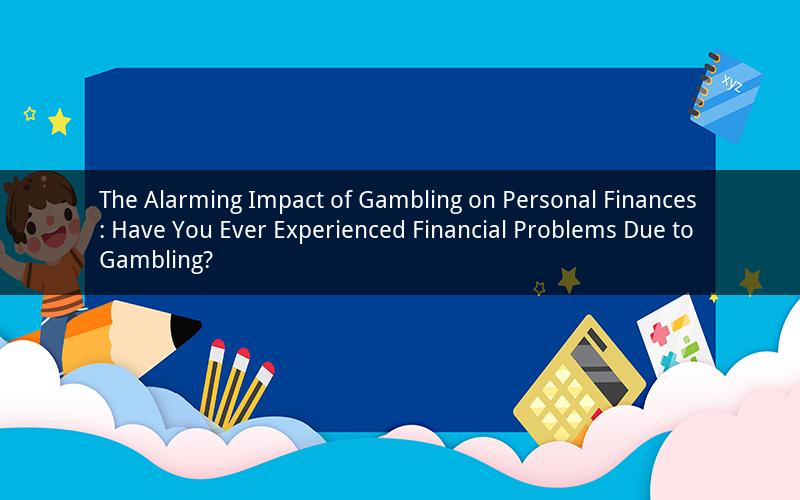
Gambling has been a part of human culture for centuries, offering a thrilling escape from the mundane and a chance to win big. However, the allure of gambling can lead to severe financial problems for some individuals. Have you ever experienced financial problems due to gambling? This article delves into the risks associated with gambling, the warning signs of a gambling problem, and the steps you can take to overcome it.
1. The Dangers of Gambling
Gambling can be addictive, and for some, it can lead to significant financial losses. The thrill of the game can blind individuals to the reality of their spending habits, and they may continue to gamble even when they are in debt. Here are some of the dangers of gambling:
a. Loss of savings and assets: Individuals may deplete their savings and sell off assets to fund their gambling habits, leading to financial instability.
b. Debt accumulation: Borrowing money to finance gambling can result in substantial debt, making it difficult to pay off other bills and obligations.
c. Relationship strain: Financial problems caused by gambling can strain relationships with family and friends, leading to emotional and social issues.
d. Legal and criminal consequences: In some cases, individuals may resort to illegal activities to fund their gambling, such as theft or fraud, leading to legal repercussions.
2. Warning Signs of a Gambling Problem
Recognizing the warning signs of a gambling problem is crucial in preventing further financial and emotional damage. Here are some common signs to watch out for:
a. Increasing debt: If you find yourself borrowing money to fund your gambling habits, it may be a sign that you have a gambling problem.
b. Neglecting responsibilities: If gambling is causing you to neglect your job, family, or other important commitments, it may be time to seek help.
c. Emotional distress: Experiencing anxiety, depression, or other emotional issues due to gambling may indicate a problem.
d. Secretive behavior: If you are hiding your gambling activities from family and friends, it may be a sign that you have a gambling problem.
3. Overcoming a Gambling Problem
Overcoming a gambling problem can be challenging, but it is possible with the right support and resources. Here are some steps you can take to overcome a gambling problem:
a. Acknowledge the problem: The first step in overcoming a gambling problem is to admit that you have one.
b. Seek support: Reach out to friends, family, or professionals for support and guidance.
c. Create a budget: Develop a budget that allocates funds for necessary expenses, savings, and entertainment without allocating money for gambling.
d. Stay away from triggers: Avoid places and situations that may trigger your gambling urge.
e. Consider professional help: If you are struggling to overcome your gambling problem, consider seeking help from a therapist or counselor specializing in gambling addiction.
4. Resources for Help
If you or someone you know is struggling with a gambling problem, there are numerous resources available to help:
a. Gamblers Anonymous: This is a 12-step program for individuals struggling with gambling addiction, offering support groups and resources.
b. National Council on Problem Gambling: This organization provides resources and support for individuals affected by problem gambling, including hotlines and counseling services.
c. Therapy: Working with a therapist can help you overcome your gambling problem and develop healthy coping mechanisms.
d. Financial counseling: If you have accumulated debt due to gambling, a financial counselor can help you create a repayment plan and improve your financial situation.
5. Preventing Future Financial Problems
To prevent future financial problems due to gambling, consider the following tips:
a. Educate yourself on the risks of gambling: Understanding the potential consequences of gambling can help you make more informed decisions.
b. Set limits: Establish a budget for gambling activities and stick to it, regardless of the outcome.
c. Monitor your spending: Keep track of your gambling expenses to ensure you are not overspending.
d. Develop healthy coping mechanisms: Find alternative ways to cope with stress and boredom, such as exercise, hobbies, or social activities.
e. Stay informed: Keep up-to-date with the latest research on gambling and its impact on personal finances to make more informed decisions.
In conclusion, gambling can be a thrilling pastime, but it can also lead to severe financial problems for some individuals. Have you ever experienced financial problems due to gambling? If so, it is essential to recognize the warning signs and take steps to overcome your gambling problem. With the right support and resources, you can overcome your gambling addiction and improve your financial and emotional well-being.
Questions and Answers:
1. Q: What are the most common causes of financial problems due to gambling?
A: The most common causes of financial problems due to gambling include loss of savings and assets, debt accumulation, relationship strain, and legal and criminal consequences.
2. Q: How can I tell if I have a gambling problem?
A: You may have a gambling problem if you are increasing your debt, neglecting responsibilities, experiencing emotional distress, or engaging in secretive behavior.
3. Q: Are there any effective treatments for gambling addiction?
A: Yes, there are several effective treatments for gambling addiction, including therapy, support groups, and financial counseling.
4. Q: Can gambling addiction be cured?
A: While there is no cure for gambling addiction, it can be managed and overcome with the right support and resources.
5. Q: How can I prevent future financial problems due to gambling?
A: You can prevent future financial problems due to gambling by educating yourself on the risks, setting limits, monitoring your spending, developing healthy coping mechanisms, and staying informed about the latest research on gambling.